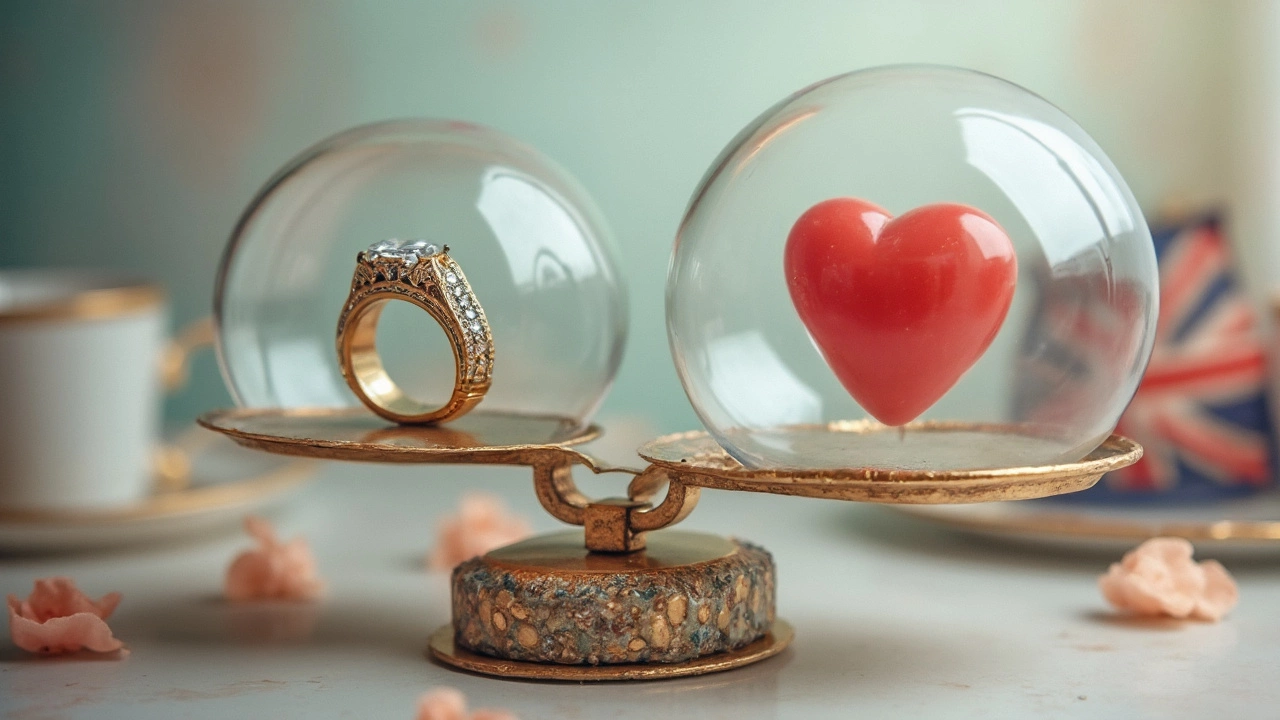Ever wondered what happens to the engagement ring when a relationship hits Splitsville before the "I dos"? It’s one of those questions that pop up like an unwelcome Facebook memory. Breaking off an engagement is tough enough, but sorting out who gets to keep that shiny symbol of love can be even trickier.
You see, engagement rings come with a lot of emotional and financial baggage. On one hand, it might feel like a gift of everlasting affection—though, 'everlasting' might feel like a stretch when the wedding's called off. On the other, there's the question of ownership. Legally, does it go to the buyer? Or does it get to stay with the person who received it?
The Emotional Attachment
Feeling attached to an engagement ring is super common. This isn't just any piece of jewelry; it's been a part of countless dreams and plans for the future. The ring often symbolizes promises, hopes, and even the beginning of a new chapter in many people's lives.
Just think about it: from the moment you slip that ring onto your finger, it becomes part of your daily life. There's that little thrill each time the light catches it just right, or when a friend gasps at its sparkle. For many, the ring is more than a symbol of commitment. It's a reminder of a partner's love and intentions.
However, when engagements fall apart, the emotional ties to the ring can get pretty tangled. It serves as a bittersweet reminder of what could have been, which can lead to tough decisions during an already emotional time. Choosing whether to hold onto it or let it go might depend on what the ring truly represents to each person. Is it a painful reminder or a cherished memory?
Interestingly, studies show that people have varying feelings about keeping their engagement rings after a breakup. Some find comfort in holding onto it as a way to remember the good moments of their relationship. Others feel a need to part with it, seeing it as a fresh start.
Whatever the case, your feelings about the ring matter. It’s useful to have clarity on what this piece of jewelry represents to you before making a decision. If the emotional weight feels heavy, it might be worth consulting with friends, family, or even professionals to get perspective.
Legal Perspectives
Navigating the legal maze around who gets to keep the engagement ring can feel like solving a Rubik's cube, but here’s the deal: it largely depends on where you live. Yep, the law varies from place to place, so the outcome could swing either way.
In many parts of the United States, the ring is considered a 'conditional gift.' Sounds fancy, right? But it basically means the ring comes with a string attached—specifically, the string of marriage. If you don't end up tying the knot, the giver might have the legal right to ask for the ring back.
But hang on, other places might see things differently. For example, in some European countries, the ring is viewed as a straightforward gift. No conditions, no takesies-backsies if the wedding bells stop ringing.
And how about down here in New Zealand? It’s not as clear-cut. Court cases have sometimes leaned towards considering it a conditional gift, but each situation can have its own quirks. So, if you're knee-deep in this quandary, spotting a lawyer would be wise.
Then there's the drama of who called off the engagement. Imagine your partner calls it quits. Some courts might see you as entitled to keeping the ring because you weren’t the one to back out.
Legal perspectives can be dry and confusing, but understanding them can save you a lot of heartache (and maybe spare you from throwing the ring into the sea in a fit of rage!). Whether it's a brand-new piece of jewelry or a treasured family heirloom, knowing the legal angle is crucial.

Cultural Differences
The issue of who keeps the engagement ring after a breakup isn’t just about legalities; it’s also tangled up in cultural norms. Different cultures approach this question in varied ways, which can make it all the more intriguing—and complex.
Let’s start with the United States, where the general rule often sees the engagement ring as a conditional gift. What does that mean? Basically, it’s given with the expectation of marriage. So, if the marriage doesn’t happen, the ring might go back to the giver. However, this can vary from state to state, and sometimes who broke off the engagement matters too.
Hop over to the UK, and you’ll find a slightly different vibe. There, the tradition leans towards viewing the engagement ring as a straight-up gift, no strings attached—even if things go south. So, the receiver tends to keep it.
Now, in many Asian countries, the question may not even arise. Engagement rings aren’t always a part of the wedding playbook. However, where they are used, the sentiment often follows local traditions, and it can differ even within the same country.
Let’s not forget the cultural mash-up in places like New Zealand and Australia, where customs are often a mix of British and American influences but can still be distinctly unique. Here, people might follow personal beliefs and family traditions more than anything.
Interestingly, some countries incorporate religious perspectives into their customs. For instance, in certain places, if religious laws consider the ring as part of a formal engagement contract, the outcome can differ per those guidelines.
In the end, cultural differences play a big role in these decisions. It’s a reminder that while laws provide one way to look at things, cultural norms tell their own story. That’s why understanding cultural backgrounds can be key when figuring out what happens to that sparkly piece of jewelry when plans change.
Practical Tips
So, you're handling a complicated situation with that engagement ring? You're not alone, and there are ways to make this easier on your heart and mind. Here are some practical tips that might help you figure out what to do next.
First things first, have a conversation. Yeah, it's uncomfortable, but it's the best way to avoid future misunderstandings. Lay out your thoughts and listen to theirs. You might find common ground.
If talking doesn't quite cut it, consider these steps:
- Check the Law: Different places have different laws about who gets the ring. In many areas, it’s seen as a "conditional gift" that goes back to the one who proposed if things fall through. Be sure to verify what your local laws say, because that might guide your decision.
- Think About the Circumstances: Did someone cheat or break a promise? Sometimes, circumstances change the moral or even legal expectation of who should keep the ring.
- Sentimental Value: If the ring is a family heirloom, it might be best to return it, especially if emotional ties run deep. This can help avoid future family drama.
- People Who Can Help: If you're both undecided, a mediator or even a trusted friend might help you settle things without conflict.
- Resale or Reuse: If all else fails and you end up with the ring, think about options like reselling it or repurposing the stones into another piece of jewelry.
Handling a broken engagement is tough. But knowing your options and approaching it calmly can make a world of difference. And remember, it’s just a ring at the end of the day. What's truly important is how you move forward.

Real-Life Stories
Let’s peek into the real world where engagement rings become the centerpiece of some pretty intriguing stories. You might think this is just a Hollywood trope, but it’s a real-life drama too. Take for example, the famous case of Zsa Zsa Gabor, where the engagement ring became the subject of intense debate after a broken engagement. Zsa Zsa insisted on keeping the rock, highlighting the emotional tie she had to it, despite the relationship falling apart.
Then there's the tale of Mariah Carey, whose engagement to billionaire James Packer ended with her confidently keeping the $10-million ring. A bit extravagant, but it brings home the point: outcomes can vary widely based on the individuals involved.
"The ring symbolizes more than just commitment; it's a blend of love, intention, and sometimes, a bit of drama." – Sydney T. Brown, Relationship Expert
For some, the engagement ring has historical significance, especially if it’s a family heirloom. In these cases, folks often return it out of respect for family traditions and history, a gesture that holds much more depth than the ring itself.
One user on a well-known forum shared their humorous ordeal—when they broke off the engagement, they both wanted to keep the ring. After lengthy discussions, they decided to split the cost, allowing one to buy it from the other. An odd solution, but it worked for them!
Real-life lessons tell us that the decision isn’t just about the ring. It’s tied up in emotions, intentions, and personal values, making each story as unique as the couple themselves.

